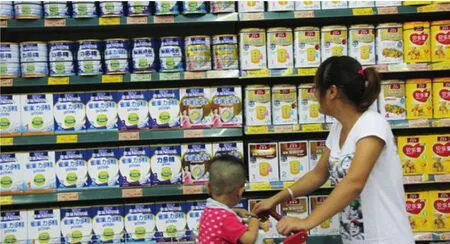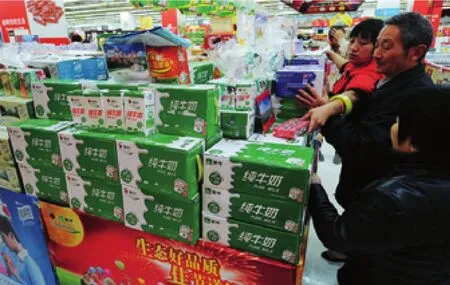Questioning the Standard
2011-10-14ByHUYUE
By HU YUE
Questioning the Standard
By HU YUE

ZHANG CHUNLEI
Dairy quality standards trigger further controversy hina’s dairy industry is once again being scrutinized as suspicions abound that major dairy enterprises played a hand in manipulating and
C lowering quality standards to save costs.
The new standards released in March 2010 set the maximum safety limit for bacteria in raw milk at 2 million cells per milliliter, four times greater than the amount allowed under previous regulations. In addition, the minimum standard for protein content was reduced from 2.95 grams to 2.8g per 100g.
Since then, critics have lambasted the decreased standards as further tainting an industry that has been mired in controversy since the melamine scandal in 2008.
“China is lagging far behind Western countries in dairy safety, and the gap may continue widening because of the low standards,” said Lu Jiaping, Director of the Institute of Agro-food Science and Technology under the Chinese Academy of Agricultural Sciences, in an interview with the21st Century Business Herald.
In Europe and the United States, the maximum safety limit for bacteria in raw milk is 100,000 cells per ml.
“They are the lowest in the world and it marks a disgraceful retreat to 25 years ago,” Wang Dingmian, President of the Guangdong Provincial Dairy Association, told Xinhua News Agency. “I believe the reason lies in huge pressures from dairy producers seeking to reap windfall profts by cutting costs,” he said.
Historic retreat?
The melamine scandal in 2008, which was blamed for the deaths of at least six children, dealt a heavy blow to affected brands and cast an ominous shadow over the entire dairy industry.
In a bid to tighten market regulation and lift the industry out of this quagmire, the Ministry of Health (MOH) in December 2008 joined hands with 10 ministries to start drafting new dairy product standards. The standards, however, have sparked heated debates since their release.
Wei Ronglu, Executive Vice President of the Dairy Association of Western China, who participated in the conferences for the standards-setting, told thePeople’s Dailythat he was confused about the new standards.
“Experts and industry insiders at the discussions agreed to set the bacteria standard in raw milk at 500,000 cells per ml,” he said.“I have no idea why and how it was changed at the last minute.”
Nadamude, Secretary General of the Dairy Association of Inner Mongolia Autonomous Region, told Xinhua that the revisions were appropriate, since stricter standards would put most milk farmers out of business.
In China, 70 percent of raw milk providers are small dairy farmers operating smallscale businesses, and often with substandard equipment, he said.
“They are less able to afford the costs of improving quality,” he said. “Setting overly demanding sanitary requirements would put a dent in their businesses and result in nationwide milk shortages.”
But Lu disagreed. “A strict bacteria limit is actually not far from reach for most dairy farmers,” said Lu.
“The government is supposed to encourage quality improvements with higher purchase prices, instead of protecting unqualifed raw milk suppliers,” he said.
“Protecting incapable dairy farmers at the expense of quality is ridiculous,” Wang said. “The lowered standards are a shame on the entire industry.”
Companies’ response
Reports have proliferated China’s media outlets that the country’s largest dairy companies had a heavy hand in revising the standards to their own advantage.
The standards for pasteurized milk were drafted by Mengniu. Yili and Bright were responsible for the standards of raw and fresh milk and yogurt, Zeng Shouying, Deputy Director of the Dairy Industry Committee of the Dairy Association of China, told thePeople’s Daily.
The three companies are China’s top three dairy makers, accounting for at least 70 percent of the country’s milk market.
But they denied tampering in the standard-setting process.
Yili said in a statement that it had participated in the standard’s drafting together with 10 other dairy companies.
“But the draft was only for reference before being submitted to authoritative experts for further discussion,” it said. “It is our responsibility to help the government do some technical work.”
Yili also said it will “abide by the government’s industry regulations and make stricter criteria for ourselves to lead the industry on a steady and healthy course of growth.”
Mengniu said it had proposed changes but did not have any say in the fnal decision on the standards.
Bright said the government has a set of strict procedures when applying new food standards.
Claims of innocence alone aren’t enough to calm people’s anger.
“You can’t rule out the possibility that the enterprises hijacked the standards to avoid the costs of improving product quality,” said Dong Jingshi, Secretary General of the International Food Packaging Association. “The policymakers should have made the standard-setting process more transparent and it would be more reasonable to allow consumers to have a greater say.”
Song Liang, a researcher with the Distribution Productivity Promotion Center of China Commerce, said in a report that the controversies would damage the industry’s public image and hurt already dwindling consumer confdence in domestic brands.
“In developed countries, there are many third-party research institutions that can help provide useful information for product testing and establishment of market rules, such as the New Zealand National Food Laboratory,” he said. “China lacks these independent institutions.”
The MOH has tried to dismiss the suspicions. “Members of the fnal review committee were all experts from universities and research institutions,” said Zhang Xudong, a MOH offcial, at a recent press conference.
Bumpy road
Three years after the tainted formula scandal, China’s dairy industry is moving out of its shadow, though problems remain.
In the frst half of 2011, Mengniu generated 790 million yuan ($124.41 million) in net profits, jumping 28.7 percent from the previous year, while the net profits of Yili skyrocketed 136.7 percent to 816 million yuan ($128.51 million). Bright also fared well, with net profts growing 20 percent to 73 million yuan ($11.5 million).

LI JIAN
“Large companies are consolidating their market dominance thanks to buoyant demand and massive closure of smaller firms,” said Zhou Siran, an analyst with the Shenzhen-based research frm CIConsulting, in a report.
The General Administration of Quality Supervision, Inspection and Quarantine, ordered in November 2010 that all dairy frms must apply for new production certificates by the end of March 2011, and those with weak quality guarantees will be shut down.
As of March 31, only 643 dairy companies, or about 55 percent of the total 1,176 frms, received licenses to continue production. Of the remaining, 426 face permanent closure while 107 were told to suspend operations until they make improvements in technologies and equipment.
Though the industry has regained much of its lost ground, product safety remains an intractable problem, added Zhou.
In August 2010, hormones were detected in some baby formula in Wuhan, capital of Hubei Province. Earlier this year, there were reports that dairy products containing leatherhydrolyzed protein, a banned additive, were also being sold.
“Another concern is that domestic businesses are facing intensifying competition as foreign brands make a rush into Chinese markets to slice a piece of the growing dairy pie, “ Ma Yu, a researcher with the Chinese Academy of International Trade and Economic Cooperation, Ministry of Commerce (MOFCOM), toldEconomic Information Daily.
New Zealand’s Natural Dairy, for instance, aims to open 3,000 retail stores across the nation this year. Japan’s Meiji Dairy announced in May to invest 3 billion yen ($38.7 million) to build a plant in Suzhou, Jiangsu Province, manufacturing high-end milk and yogurt.
In another move, MOFCOM also expected China’s dairy imports to hit a record high of 1.2 million tons this year, leaping from only 745,000 tons in 2010.
“Foreign formula brands, in particular, are gaining popularity among Chinese consumers, making many Chinese enterprises suffer from growing inventories and financial strains,” said Ma.
A recent report of the General Administration of Customs said more than 80 percent Chinese consumers believe foreign formula brands are more reliable than domestic ones.
“To compete with foreign rivals, Chinese enterprises need to focus on improving product quality to restore the trust of consumers,”said Wang Jinghai, President of Wondersun Dairy Industry Ltd. based in Harbin, Heilongjiang Province.
“Meanwhile, it is necessary for the frms to secure a stable source of raw milk supplies, and the government should also hand out more policy incentives,” he added.
